What Can Void A Car Warranty? [Partial & Complete Voids]
August 10, 2022
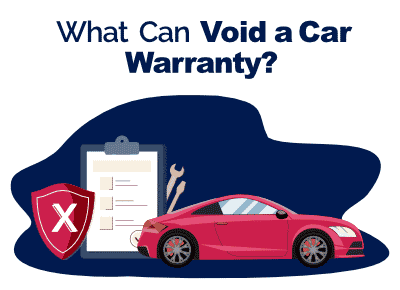

Michael Collado is a car buying expert and has been a professional automotive writer since 2009. He’s written about dealership sales, vehicle reviews and comparisons, and service and maintenance for over 100 national automotive dealerships. Previously, Collado was a copywriter at the ad agency TBWA/Chiat/Day where he worked on brand campaigns for Nissan, ABC Television, Sony PlayStation, and Energizer. His recognition in the ad industry includes awards from Communication Arts and The Clios.
Collado has a Bachelor’s degree from the University of South Florida, with a major in Psychology and a minor in Marketing.
After spending the extra costs associated with extended warranties, the last thing you want to see is the phrase "Claim Denied."
It helps to be prepared, so we'll give you a rundown of the most common things that can partially or completely void your car warranty.
In addition, we'll show you some tricks to avoid any warranty claim issues.
Table of Contents
- What Does A Partial Warranty Void Mean?
- Things That Can Void Your Entire Warranty
- What Can Cause A Warranty Claim To Be Denied?
- What If My Warranty Claim Is Denied?
- How To Avoid Warranty Claim Issues
- What Modifications Do Not Void Your Car Warranty?
- Should I Get An Extended Warranty
- Best Car Deals by Category
- Frequently Asked Questions
What Does A Partial Warranty Void Mean?
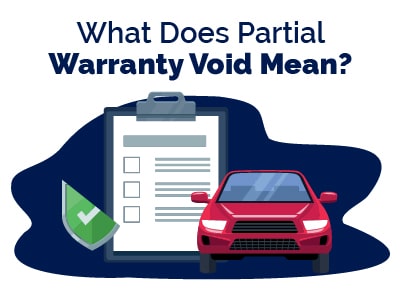 A partially voided warranty is when a warranty issuer will only cover a part of a repair or a partial parts replacement.
A partially voided warranty is when a warranty issuer will only cover a part of a repair or a partial parts replacement.
There are several reasons why a warranty could be partially voided. Usually, a warranty will be partially voided if the vehicle driver has taken an action that is forbidden by the warranty, which we'll cover later.
Things That Can Void Your Entire Warranty
Here’s a look at some of the common actions that can lead to a complete void of a vehicle warranty:
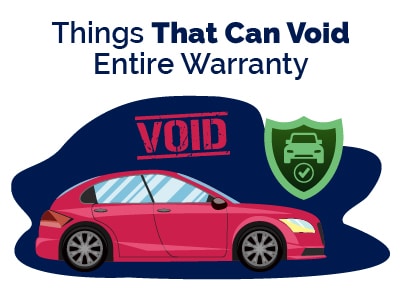 Off-road driving
Off-road driving- Overloading
- Racing
- Reckless driving
- Natural disasters such as fire, earthquakes, or hurricanes
- Using improper fluids
- Adding disallowed modifications
If you are in doubt, you should contact the issuer of the warranty. For instance, if you want to go off-roading, you should contact the warranty issuer and see what type of off-roading activities are allowed.
What Can Cause A Warranty Claim To Be Denied?
It’s a good idea to know why your warranty claim can be denied. Sometimes you can be denied because of the nature of the coverage. Other times, your warranty can be denied because of specific actions you have taken.
Here’s a look at the top reasons why a warranty claim can be denied:
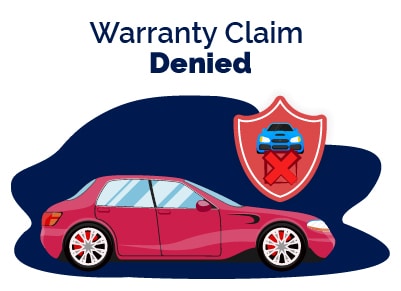 The part of the component is not covered under the warranty
The part of the component is not covered under the warranty- The area that needs service was misused or abused
- There are disallowed aftermarket modifications made to the vehicle
- The vehicle was damaged by a natural disaster
- Your vehicle has been salvaged
- There were unnecessary repairs made
- The repair shop chosen overcharged for the service
- There are signs of a lack of maintenance
- The area that is repaired was a pre-existing condition
What If My Warranty Claim Is Denied?
If your warranty claim has been denied, you don’t have to panic. That's because just about every warranty company has an appeals process. Each process is going to be different depending on who issued the warranty.
Be sure to file the appeal right away. Additionally, be prepared to have any paperwork or evidence that can support your claim. For instance, if your claim was denied because of lack of maintenance, then be sure to gather all of your vehicle’s maintenance records.
How To Avoid Warranty Claim Issues
Make sure you don’t have to deal with warranty headaches. Here are eight steps that you can take to ensure that you don’t have to deal with warranty claim issues:
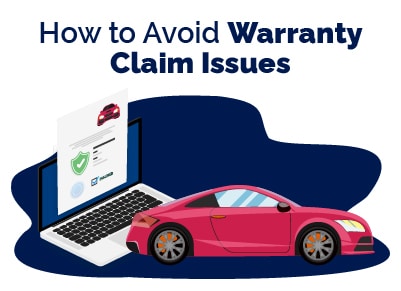 Choose a warranty provider with an excellent reputation
Choose a warranty provider with an excellent reputation- Carefully review the contract and ask any questions before you sign
- Keep up with the vehicle’s regular maintenance schedule
- Save all of your receipts associated with your repairs
- Address any mechanical issues right away.
- Double-check your coverage
- Wait for warranty authorization before you have the vehicle repaired.
If you still have any questions about your warranty, consult your warranty website or contact the warranty issuer’s customer service team.
What Modifications Do Not Void Your Car Warranty?
Not all warranties are the same. However, some common modifications that will not void your warranty include:
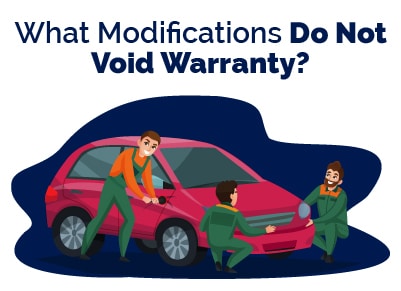 Suspension
Suspension- Wheels
- Brakes
- Exterior modifications
- Sway bars
- Short shifter
Be sure to check the warranty to see which specific modifications will not void your warranty.
Should I Get An Extended Warranty
If you plan to own your vehicle beyond the miles or the duration of the original warranty, then an extended warranty is going to be a good idea.
Here are our in-depth articles about extended warranties and what is covered under different warranties.
Best Car Deals by Category
Frequently Asked Questions
Can I remove modifications to my car before servicing?
Typically, you should not remove any modifications before having your car serviced. If you only have authorized modifications on your vehicle, then there is no need to alter your vehicle before it receives service.
How can I make a warranty claim?
When you need to have your vehicle repaired, you will want to contact the warranty company before you have the vehicle repaired. Ask the warranty company for a list of authorized repair shops in your area. From there, you will want to get at least three estimates. Take the estimate that you are most comfortable with and submit it to the warranty company. Wait for the authorization and then have the vehicle repaired.
Will doing my maintenance void the warranty?
You can do your regular maintenance on your vehicle. It is against Federal law for a warranty company to deny a claim because you perform your maintenance. However, it is a good idea to know what qualifies as routine maintenance. Traditionally, changing your tire, changing your oil and your filters will qualify as routine maintenance.
Will an oil change void my warranty?
If you perform a regular oil change, then it should not void your warranty. However, it is a good idea that you have experience in changing your oil and making sure that you use the right motor oil for your vehicle. For instance, higher-end or luxury vehicles will typically need synthetic oil. Be sure to ask your manufacturer which type of motor oil is ideal for your vehicle.
Posted in Car Buying Tips, Car Warranty |
- Car Extended Warranty Guide
- Different Types of Car Warranties
- What's the Deal with Extended Warranties in California?
- Hybrid & EV Battery Warrranty Guide
- Best Warranty Provider Comparison
- Calculate Extended Warranty Cost
- What Can Void a Car Warranty?
- Interesting Car Warranty Statistics
- How to Stop Car Warranty Calls






